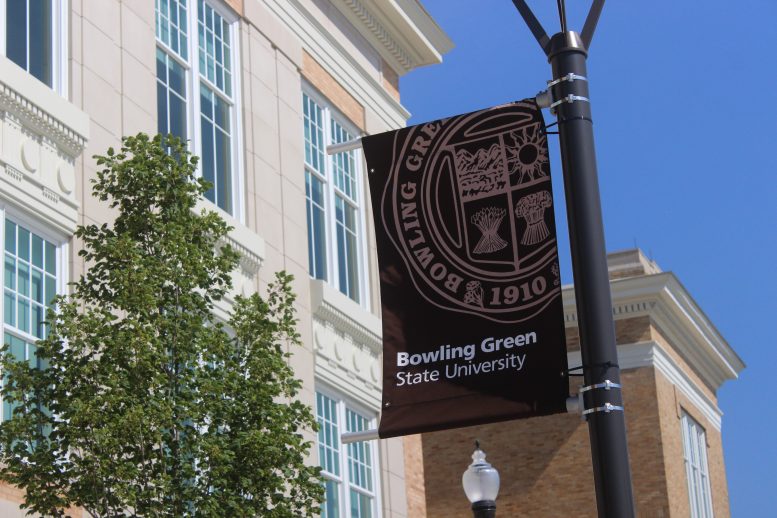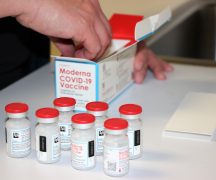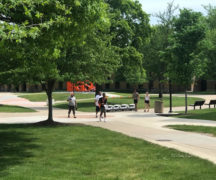By DAVID DUPONT
BG Independent News
Wood County Health Commissioner Ben Batey didn’t waste any time in making his presence known on the Bowling Green State University.
The evening after his resignation from his county post was accepted, Batey, who will officially join the BGSU administration late this month as its chief health officer, joined President Rodney Rogers and Provost Joe Whitehead in addressing questions and concerns posed by students, parents, and community members about students’ return to campus in August.
The semester will begin Aug. 26 and continue until Nov. 25 with students then returning home. The last two weeks of the semester will be conducted online.
“Nothing is going to be 100 percent,” Batey said. “We’re trying to build as much safety as possible in the entire process when you come on campus.”
That process includes requiring people to where face coverings inside all public and shared spaces as well as outside when they are not able to socially distance.
For those who can’t wear masks, or where they may pose a safety hazard, other arrangements, such as shields, will have to be made, he said.
And people who are at elevated risk of catching the virus, he said, may have to use both. That could be true for faculty.
“The more barriers we put up, the safer we are,” he said.
Even with that, Batey said, it is likely that there will be an increase in cases on campus and in the community. That’s inevitable as society opens up.
The risk of the virus for young people is low, he said. Generally, when they contract COVID-19 the symptoms are mild.
But they can still pass that virus onto someone older or who is at greater risk.
Rogers said that this is a community commitment.
It is important that everyone realize it is a community issue. That’s the reason the university sought out Batey. He knows the county and greater Northwest Ohio, and can help foster collaboration within the region.
Students who don’t follow the protocols will be disciplined, Rogers said.
“It will be different this fall than it was last fall. What we want to do is make sure we’re protecting everyone’s health.”
He said that the university has purchased hundreds of hand sanitizing stations, 300 gallons off hand sanitizers and passive thermometers that can take a person’s temperature as they walk by.
Classes will be offered in three formats, Whitehead said.
Most, about 75 percent, will be offered in a face-to-face hybrid format.
In these classes students will meet face to face with professors and other students while some parts of the instruction will take place online.
For smaller classes, all students will be able to attend all class meetings. However, for larger sections, some students may just be physically in class once a week, and otherwise watching a livestream of the lectures.
According to information circulated to faculty a week ago, those classes must also be recorded so they are available for students who are not able to participate at the scheduled class time.
More than 500 classes, about 12 percent of classes, will be offered in a remote format. Those classes will offered at a set time with the professor presenting instruction to students who are not present. These also will be recorded for students who cannot participate at the set time.
Online courses, about 12 percent of those offered, have no set time and are available whenever students wish to access them.
The university is also developing BGSynch which will offer enhanced services.
Professors, Whitehead said, will hold regular office hours, either in a socially distanced face to face or virtually.
Students will not get a break on tuition, Rogers said. These formats are not cheaper to present, and looking at institutions that operate only online, the cost per credit hour tends to be higher than at BGSU. Tuition at BGSU is “a great value,” he said.
On Facebook Live, one of two options for watching the virtual town hall, this elicited an eruption of angry face emojis.
Rogers did say that students’ room and board bills will reflect the shorter semester on campus.
The student recreation center is set to open July 6, and Jerome Library will also be open in the fall as will the Learning Commons with tutoring available.
Rogers said that the university is anticipating having sports with members of some teams already reporting.
Those contests will have to take place in a socially distanced manner.
However, Rogers and Whitehead were less certain when asked about arts events.
Batey said the state has yet to open up the state for mass gatherings.
Whitehead said that arrangements have been made for flight instruction to resume.
Also, lab classes will be offered with safety precautions in place. Instructors will be asked to try to schedule as many of those lab activities into the earlier weeks in case the university is forced to go entirely online later in the semester.
Art studios could follow similar procedures, and screening will be in place for music lessons.
But the fate of performances is still up in the air.
Rogers, who was an undergraduate music major, said he was hoping the creativity of those in the arts will come to the fore and new options will be put forth.
Some performances, he said, could be presented to smaller audiences, but would also be live streamed.
No mention was made about how casts for theater production or large music ensembles such as bands and the orchestra could rehearse, not to mention choirs which are considered particularly risky because of the projection of droplets. One performance by university choirs scheduled for next spring with the Toledo Symphony has already been canceled.
Rogers concluded by saying “we need to move forward.”
That must be done “in a way that makes sure our community is safe,” he said
He expressed optimism that that “when we get on the other side” people will be able to look back at everything they’ve learned that that has made “each of us a better person.”





